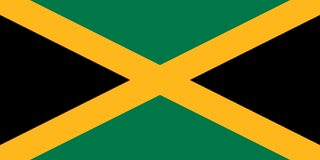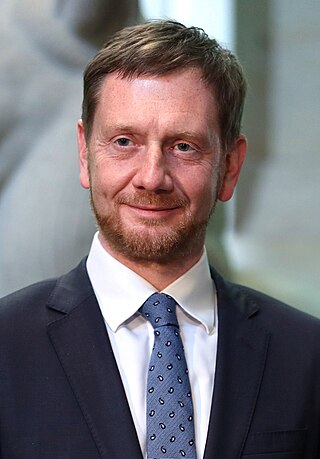
Germany is a democratic and federal parliamentary republic, where federal legislative power is vested in the Bundestag and the Bundesrat.

Jamaica coalition is a term in German politics describing a governing coalition among the parties of the Christian Democratic Union/Christian Social Union (CDU/CSU), Free Democratic Party (FDP), and the Green Party.
Grand coalition is a nickname in German politics describing a governing coalition of the parties Christian Democratic Union (CDU) along with its sister party the Christian Social Union of Bavaria (CSU) and the Social Democratic Party (SPD), since they have historically been the major parties in most state and federal elections since 1949. The meaning of the term may change due to the growth of some formerly minor parties in recent years.

Hubert Dietmar Woidke is a German politician of the Social Democratic Party of Germany. Since August 2013, Woidke has served as Minister President of Brandenburg.

Federal elections were held in Germany on 26 September 2021 to elect the members of the 20th Bundestag. State elections in Berlin and Mecklenburg-Vorpommern were also held. Incumbent chancellor Angela Merkel, first elected in 2005, chose not to run again, marking the first time that an incumbent Chancellor of the Federal Republic of Germany did not seek re-election.

The 2019 Brandenburg state election was held on 1 September 2019 to elect the members of the 7th Landtag of Brandenburg. It took place on the same day as the 2019 Saxony state election. The outgoing government was a coalition of the Social Democratic Party (SPD) and The Left, led by Minister-President Dietmar Woidke.

Amira Mohamed Ali is a German politician and member of the Bundestag since 2017. From 12 November 2019 till October 2023, she was the parliamentary co-chairperson of The Left alongside Dietmar Bartsch. In October 2023, she left The Left alongside others like Sahra Wagenknecht to found a new party. Mohamed Ali is the chairwoman of the board of the Bündnis Sahra Wagenknecht-Association which was founded to prepare a new party in January 2024.

The 2024 Thuringian state election was held on 1 September 2024 to elect the members of the 8th Landtag of Thuringia. It was held on the same day as the 2024 Saxony state election.
In the run-up to the 2025 German federal election, which will take place on 23 February 2025, various organisations are carrying out opinion polling to gauge voting intentions in Germany. Results of such polls are displayed in this list.

A federal election will be held in Germany on 23 February 2025 to elect the 630 members of the 21st Bundestag. Originally scheduled for 28 September 2025, the elections were brought forward due to the collapse of the governing coalition during the 2024 German government crisis. It is the fourth snap election in the history of post-war Germany after those in 1972, 1983 and 2005.

In Germany's federal electoral system, a single party or parliamentary group rarely wins an absolute majority of seats in the Bundestag, and thus coalition governments, rather than single-party governments, are the usually expected outcome of a German election. As German political parties are often associated with particular colors, coalitions are frequently given nicknames based on the colors included. Prominent political parties in Germany are the CDU/CSU (black), the SPD (red), the Greens (green), the Left, the AfD (blue), and the FDP (yellow).

The election to the state parliament Landtag of Brandenburg of 22 September 2024 was the third state election within Germany in the month of September 2024, three weeks after the state elections in Thuringia and in Saxony, all part of former East Germany. The outgoing government was a black-red-green "flag of Kenya" coalition consisting of the Social Democratic Party (SPD), the Christian Democratic Union (CDU) and The Greens, led by Minister-President Dietmar Woidke of the SPD.

The 2024 Saxony state election was held on 1 September 2024 to elect members to the 8th Landtag of Saxony. It was held on the same day as the 2024 Thuringian state election. Going into the election, the state government was led by Michael Kretschmer of the CDU as Minister-President, in a coalition with the Greens and the SPD.
The Sahra Wagenknecht Alliance – Reason and Justice is a political party in Germany founded on 8 January 2024. It has been described as left-wing populist, left-wing nationalist, socialist, culturally conservative, socially conservative, Eurosceptic and far-left. The party is sceptical of green politics and support for Ukraine in the Russo-Ukrainian War, and has been described as Russophilic by critics, which BSW disputes.

On 6 November 2024, Olaf Scholz, the incumbent chancellor of Germany, announced the dismissal of Christian Lindner, the then-finance minister and leader of the Free Democratic Party (FDP), from his cabinet. This occurred following recent disputes in the three-party coalition government over the country's economic policies and ongoing tensions within the coalition. Lindner's dismissal caused the collapse of the coalition, as the FDP moved into the opposition, leaving a two-party minority government of SPD and The Greens.

The fourth Woidke cabinet is the current state government of Brandenburg formed on December 11, 2024. Incumbent Social Democratic Party (SPD) Minister President Dietmar Woidke leads the coalition of his party and the Sahra Wagenknecht Alliance (BSW). This government ushered in the BSW as governing partner in any government in Germany for the first time as a so-called "red–purple coalition", two days ahead of their entrance into the Voigt cabinet in Thuringia.
Robert Crumbach is a German politician. He has been Deputy Minister-President and Minister of Finance and Europe of the State of Brandenburg in the fourth Woidke cabinet since 2024. In addition, he has been State Chairman of the BSW Brandenburg since 2024 and was parliamentary group leader of the BSW parliamentary group in the Landtag of Brandenburg from September to December 2024.

In German politics, a Blackberry coalition also called a black-purple-red coalition or red-purple-black coalition is a governing coalition between the Christian Democratic Union of Germany, Social Democratic Party of Germany and the Sahra Wagenknecht Alliance. Such arrangements were first discussed due to the mathematical possibility of such a new government coalition emerging before the state elections in Saxony and Thuringia in 2024.

In the Federal Republic of Germany, the term Chancellor candidate is the term for the "top candidate" nominated by political parties who would be elected chancellor by the Bundestag in the event of a parliamentary majority of his or her party in a German federal election. The parties thereby indicate that their parliamentary group (Fraktion) wants to elect this candidate as chancellor in the newly constituted German Bundestag. The smaller parties normally refrain from naming a candidate for chancellor. Before 2002, only candidates from the sister parties CDU/CSU and a representative of the Social Democratic Party (SPD) competed against each other in federal elections using the term "Kanzlerkandidat". In the 2002 German federal election, a Free Democratic Party (FDP) candidate for chancellor ran for the first time and in the 2021 German federal election, a candidate for chancellor was nominated for the first time by Alliance 90/The Greens. In the upcoming 2025 German federal election, a chancellor candidate will be nominated by Alternative for Germany (AFD) and Sahra Wagenknecht Alliance (BSW).
















